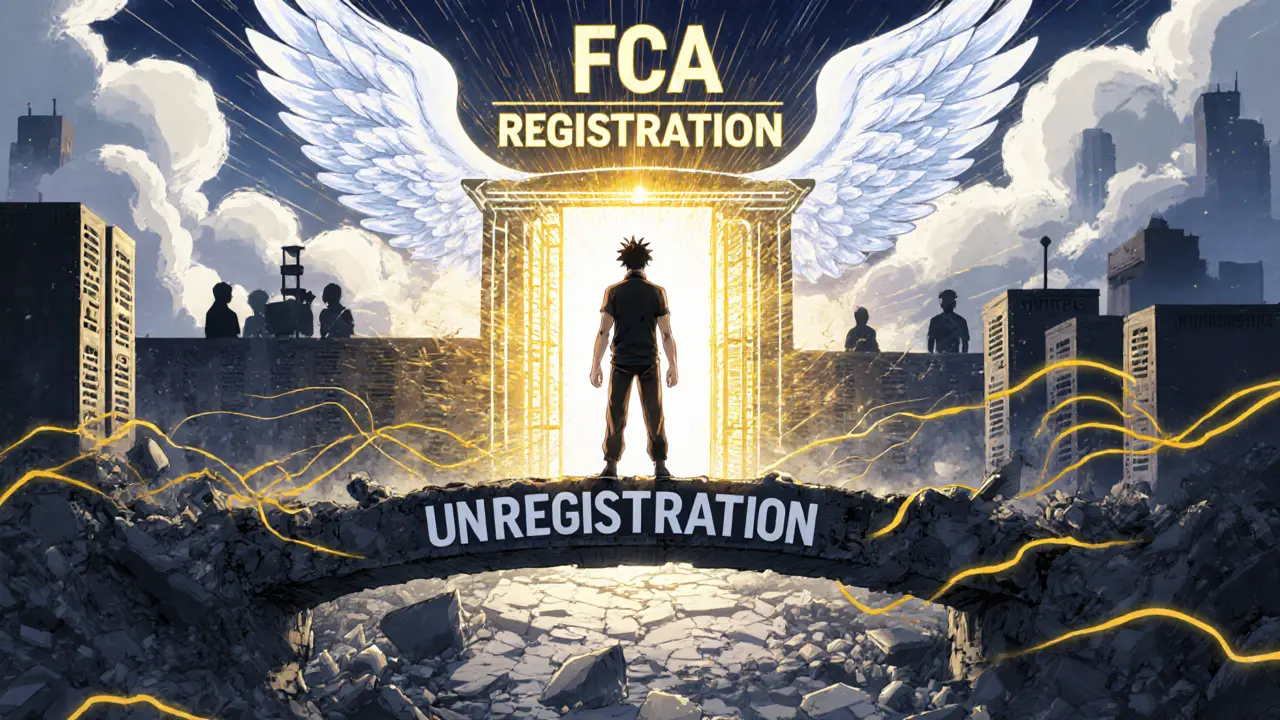VASP Registration Cost Estimator
Estimate Your UK VASP Registration Costs
Get a realistic estimate of costs based on your business size, services, and compliance needs
Estimated Total Cost
Cost Breakdown
Important Note: These estimates are based on FCA requirements and industry standards. Actual costs may vary based on specific business operations, regulatory complexity, and consultant fees. Most firms spend between £20,000 and £100,000+ to complete the registration process.
If you're running a crypto business and want to serve customers in the UK, you must register with the Financial Conduct Authority (FCA) as a Virtual Asset Service Provider (VASP). This isn't optional. It’s the law. Since September 1, 2023, any company advertising, selling, or facilitating crypto services to UK residents has to get approved by the FCA-or shut down operations there. No exceptions. No gray areas. If you’re marketing to UK customers, even from abroad, you’re in scope.
Who Needs to Register?
It’s not just exchanges. The FCA’s rules cover any business that handles virtual assets as part of its operations. That includes:- Crypto exchanges and trading platforms
- Crypto ATMs located in the UK
- Wallet providers offering custodial services
- Staking platforms that hold users’ assets
- Token issuers selling to UK investors
- Any firm that facilitates transfers between crypto and fiat currencies
The key trigger isn’t where you’re based-it’s whether you’re targeting UK users. If your website is in English, accepts GBP, or runs ads on UK social media, you’re considered to be operating in the UK. Even if your team is in Estonia or Singapore, the FCA will still require registration.
There’s one exception: if you’re just a passive holder of crypto and occasionally send funds to UK users without any marketing or business infrastructure here, you likely don’t need to register. But if you’re offering services, collecting fees, or promoting your platform to UK customers-you’re in.
The FCA’s Core Requirements
Getting registered isn’t about filling out a form. It’s about proving you can operate safely, securely, and transparently. The FCA doesn’t just check boxes-they dig into your entire business model. Here’s what they demand:- Anti-Money Laundering (AML) and KYC systems: You need verified identity checks for every customer, ongoing transaction monitoring, and a system to flag suspicious behavior. The FCA expects real-time alerts, not monthly reports.
- Financial strength: You must show you have enough capital to cover losses and keep running for at least 12 months under stress. This means audited financial statements, proof of funding, and clear accounting practices.
- Cybersecurity: Your systems must be hardened against hacks. That includes multi-factor authentication, encrypted data storage, regular penetration testing, and incident response plans. The FCA has rejected applications for weak password policies.
- Organizational structure: Your leadership team must be clearly defined. Roles can’t be blurred. You need a compliance officer, a money laundering reporting officer (MLRO), and documented internal controls.
- Client asset protection: Customer crypto and fiat funds must be kept separate from your company’s money. No commingling. No using client funds to cover operational costs.
These aren’t suggestions. They’re non-negotiable. The FCA has publicly rejected over 100 applications since 2023-not because of technical flaws, but because applicants didn’t take these requirements seriously.
The Travel Rule: What It Means for You
One of the biggest changes since 2023 is the mandatory implementation of the Travel Rule. This rule, based on FATF Recommendation 16, requires VASPs to share specific information during every crypto transfer over £1,000.That means:
- For every outgoing transfer, you must send the sender’s full name, account number, and address.
- For every incoming transfer, you must verify the recipient’s name and account details.
- If the recipient is using an unhosted wallet (like a personal MetaMask), you must collect and retain their identifying info.
Failure to comply can result in fines, suspension, or outright license revocation. The FCA has already issued warnings to firms that tried to bypass this by labeling transfers as “personal” or “non-commercial.” There’s no loophole. Every transfer above the threshold must be tracked.
Many businesses struggle with this because most crypto wallets don’t automatically share this data. You’ll need integration with a Travel Rule compliance vendor-like Elliptic, Chainalysis, or Notabene-to automate the process. Doing it manually isn’t scalable and won’t pass FCA review.

The Application Process: What You Need to Submit
You apply through the FCA’s online Connect system. But before you even hit submit, you need a full package:- Company registration documents (Certificate of Incorporation, Articles of Association)
- Organizational chart showing management hierarchy
- AML/CFT policy and procedures manual
- Proof of financial resources (bank statements, investor funding letters)
- Business plan outlining services, target market, and growth strategy
- Details of all key personnel, including CVs and background checks
- IT and cybersecurity architecture diagrams
- Proof of Travel Rule system implementation
Each document must be complete and consistent. The FCA has rejected applications because the business plan mentioned crypto staking, but the AML policy didn’t cover it. They check for contradictions. They look for gaps.
Every person in a senior role-founders, directors, compliance officers-must pass a “Fit and Proper” test. This includes criminal background checks, financial history reviews, and interviews. If you’ve ever been banned from a financial license in another country, you’re likely disqualified.
How Long Does It Take?
There’s no fixed timeline. Some applications are approved in 4 months. Others take over 18 months. It depends on how clean your submission is.Applications with incomplete documentation or unclear policies get bounced back. The FCA doesn’t give you a second chance to fix mistakes-they just reject you. Then you start over.
On average, businesses that hire experienced regulatory consultants complete the process in 6-9 months. Those trying to go it alone often take 12-18 months-or never finish.
The FCA holds regular information sessions in London, Manchester, and Edinburgh. The next ones are scheduled for autumn 2025. Attending one won’t speed things up, but it will show you exactly what they’re looking for. Many firms that attend these sessions get their applications approved on the first try.
Why Do So Many Get Rejected?
The biggest reason? Underestimating the depth of compliance needed.Many crypto startups think: “We’re a tech company, not a bank.” But the FCA doesn’t care. If you’re moving crypto in and out of fiat, you’re treated like a financial institution. That means:
- No more “we’ll do KYC later” - it has to be done before any transaction.
- No more using third-party KYC tools without audit trails - you’re responsible for the data.
- No more ignoring unhosted wallet transfers - you must collect and store that info.
Another common failure: banking access. Even if you get approved by the FCA, many traditional banks still refuse to open accounts for crypto firms. Without a bank account, you can’t process fiat deposits or withdrawals. You need to secure a banking partner before you apply-otherwise, you’ll be approved but unable to operate.
Some firms try to use payment processors like Stripe or PayPal. Those services often shut down crypto-related accounts without warning. The FCA expects you to have stable, direct banking relationships.

What Happens After You’re Approved?
Registration isn’t the finish line-it’s the starting line.Once approved, you must:
- Submit annual AML reports
- Undergo independent financial audits
- Update your policies if regulations change
- Report any material changes to your business (new services, leadership changes, system outages)
- Keep all transaction records for at least five years (eight for certain high-risk activities)
The FCA can visit your office unannounced. They can demand access to your systems. They can freeze your operations if they find a breach.
There’s no “set it and forget it.” Compliance is continuous. You need a dedicated compliance team or outsourced provider. You can’t rely on part-time staff or interns to handle this.
Alternatives If You Can’t Get Registered
If your application is rejected or you can’t meet the requirements, you have options-but they’re not easy:- Move your target market to a jurisdiction with lighter regulation (like Portugal, Malta, or Dubai), but make sure you’re not still marketing to UK users.
- Partner with a licensed UK VASP that can act as your sponsor or payment processor (some firms offer white-label compliance services).
- Restrict your services to non-custodial tools only-like decentralized wallets or peer-to-peer platforms where you don’t hold assets.
But if you’re still marketing to UK customers, there’s no legal workaround. The FCA monitors ads, domain registrations, and payment gateways. They know who’s targeting them.
Final Reality Check
VASP registration in the UK is expensive, time-consuming, and complex. It costs between £20,000 and £100,000+ to get approved, depending on your business size and complexity. Most small crypto startups don’t survive the process.But if you’re serious about building a long-term business in Europe, the UK is still the most credible market. Once registered, you gain trust from institutional investors, enterprise clients, and even traditional banks. It’s a badge of legitimacy.
Don’t rush it. Don’t cut corners. Don’t assume your tech background means you can handle compliance. Hire experts. Use consultants. Attend FCA sessions. Read their official guidance-word for word.
The FCA isn’t trying to shut down crypto. They’re trying to stop criminals. If your business is clean, transparent, and compliant-you’ll get through. But if you’re cutting corners, you won’t even make it to the first review.
Do I need to register if my crypto business is based outside the UK?
Yes, if you’re marketing or advertising your services to UK customers. The FCA’s rules are based on where you’re targeting, not where you’re headquartered. Even if your team is in Canada or Singapore, if your website accepts GBP, uses UK phone numbers, or runs ads on Google UK, you’re required to register.
Can I operate while my VASP application is under review?
No. You cannot legally provide crypto services to UK customers while your application is pending. Doing so is a criminal offense under UK law. The FCA has prosecuted multiple firms for operating without registration-even if their application was in progress.
What happens if I don’t register and keep serving UK users?
You risk criminal prosecution, asset freezes, fines up to unlimited amounts, and being blocked from UK payment processors and banks. The FCA can also work with international regulators to shut down your operations globally. Many unregistered firms have been forced to shut down completely after FCA enforcement actions.
How much does VASP registration cost in the UK?
The FCA application fee ranges from £5,000 to £50,000 depending on your business size and complexity. But the real cost is in compliance setup: AML systems, legal counsel, cybersecurity audits, and staffing. Most firms spend between £20,000 and £100,000 total before they’re approved.
Can I use a third-party KYC provider instead of building my own system?
Yes, but you’re still responsible for the results. The FCA doesn’t care if you use Jumio, Onfido, or Sumsub-as long as your system verifies identities accurately, logs all actions, and flags suspicious behavior. You must be able to prove the third-party provider meets FCA standards and that you monitor their performance.
Do I need to register if I only offer non-custodial wallets?
Not if you truly don’t hold or control users’ private keys. Non-custodial wallets that simply provide software access to blockchains (like MetaMask or Trust Wallet) are generally exempt. But if you offer any service that holds, transfers, or exchanges assets on behalf of users, you’re considered a VASP and must register.
What’s the difference between registration and licensing in the UK?
The FCA calls it “registration,” but legally, it’s a licensing regime. You’re not just signing up-you’re being authorized to operate under UK financial law. The FCA conducts full background checks, interviews, and risk assessments. You’re granted permission to operate, not just added to a list.









Comments (13)
Will Atkinson
October 28, 2025 AT 04:35 AMWow, this is such a clear, no-nonsense breakdown-seriously, thank you for laying it all out like this! 🙌 I’ve seen so many crypto founders think they can ‘wing it’ with compliance, but the FCA isn’t playing around. This post should be mandatory reading for anyone even thinking about targeting the UK market. I’m sharing it with my whole startup group right now!
emma bullivant
October 29, 2025 AT 17:46 PMim so tired of people acting like regualtion is the enemy when its just the cost of doing business with real people 😅 i mean like… if you want to touch the UK market you gotta play by their rules. its not about being ‘anti-crypto’ its about not being a money laundering hub with a website. the travel rule? yeah its annoying but its not rocket science. just use notabene and move on.
Karla Alcantara
October 30, 2025 AT 23:36 PMThis is such a vital resource-I’ve been helping a few friends navigate this process and I keep sending them back to this post. The part about banking access being the silent killer? So true. So many get approved by the FCA, then realize no bank will touch them. It’s heartbreaking. If you’re serious about this, start talking to fintech-friendly banks *before* you even submit. Chase, Revolut, and some EU-based neobanks have been more open lately. Don’t wait until it’s too late!
Jessica Smith
October 31, 2025 AT 15:52 PMOf course you need to register. Anyone who thinks otherwise is either delusional or a criminal. The FCA isn’t out to get you-they’re out to stop the next FTX. If you can’t handle KYC, AML, and the Travel Rule, you don’t belong in finance. Period. Stop pretending crypto is above the law. It’s not a startup. It’s a financial institution. Act like it or get out.
Petrina Baldwin
November 1, 2025 AT 09:59 AMJust don’t do it. Too much hassle. Move to Malta.
Peter Schwalm
November 2, 2025 AT 00:05 AMReally appreciate this breakdown. One thing I’d add-don’t underestimate how much time the ‘Fit and Proper’ interviews take. They’re not just formality. They dig into your personal history, your past business failures, even your social media. One founder I know got rejected because he had a 2018 tweet joking about ‘skipping KYC.’ The FCA saved a screenshot. Seriously. Be careful what you post. And if you’re using a third-party KYC tool? Make sure you have logs showing *you* reviewed every flagged transaction. Not just the vendor’s report.
Shruti rana Rana
November 3, 2025 AT 07:07 AMThis is absolutely brilliant! 🌟 Thank you for such a detailed and compassionate guide. As someone from India, I’ve watched many Indian crypto teams struggle with UK compliance-this is the roadmap they need. The Travel Rule section? Game-changer. I’ve shared this with my fintech community in Mumbai and Delhi. Keep up the amazing work! 💪✨
Stephanie Alya
November 4, 2025 AT 19:19 PMSo you’re telling me I need to spend $80k just to prove I’m not a criminal? 😂 cool. I’ll just sell to Canadians then. At least they don’t make you hire a full-time compliance officer who gets paid more than the devs. #CryptoIsNotABank
olufunmi ajibade
November 5, 2025 AT 11:11 AMWho even is the FCA to demand all this? You think African and Asian crypto founders are supposed to afford £100k in legal fees? This is just colonial finance dressed up as regulation. You want to protect users? Then help us build systems-not gatekeep access with billionaire law firms. I’ve seen startups in Lagos and Nairobi shut down because they couldn’t afford a single compliance audit. This isn’t safety. It’s exclusion.
Manish Gupta
November 6, 2025 AT 16:05 PMGood guide but what about the timezone issue? If my team is in India and FCA wants to call for an interview at 3am their time, what do we do? Also, do they accept documents in Hindi or only English? I'm trying to help a friend and this part is unclear.
Gabrielle Loeser
November 7, 2025 AT 13:06 PMWhile the requirements are rigorous, they are not unreasonable. Financial integrity must be prioritized, especially in an industry prone to volatility and exploitation. A well-structured compliance framework not only meets legal obligations but also fosters long-term sustainability and public trust. This is not an obstacle-it is a foundation.
Cyndy Mcquiston
November 8, 2025 AT 09:35 AMUK thinks it’s still the center of the world. Sorry, but crypto is global. You want to regulate? Fine. But don’t act like you’re the only one who matters. We’re moving on. Good luck keeping up.
Abby Gonzales Hoffman
November 8, 2025 AT 21:20 PMJust got approved last month after 11 months of hell-and this post is 90% of why we succeeded. We hired a UK-based compliance consultant (not a US one!) and did a dry-run submission with their template. The FCA rejected our first draft for saying ‘we’ll handle Travel Rule manually.’ We laughed. Then we cried. Then we bought Notabene. If you’re reading this and you’re still on the fence-stop dreaming. Start building. You’ve got this.